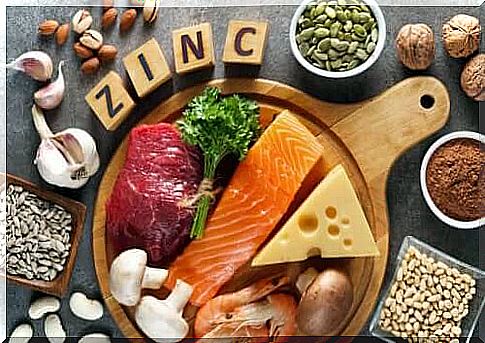Zinc In Children’s Diets: Everything You Should Know

Zinc is an essential mineral for the human body. It serves several functions in the body and it is important to be sure to meet the daily needs. Although it is not common to suffer from zinc deficiency, such a situation can affect a person’s health, which is why zinc in children’s diets is so important.
Before we begin, we need to be aware of the importance of ensuring that the levels of micronutrients in the human body are optimal. They are found in almost all foods and perform critical functions related to human physiology.
The importance of zinc in children’s diets
Children have an immature immune system that is still developing. Therefore, it is common for them to get sick when they come in contact with their schoolmates. However, you can minimize this risk through diet by including the right foods.

In particular, zinc is an element that has been shown to be the key to the functioning of the immune system. According to a study in the journal Nutrients , it contributes to the differentiation of the white blood cells that are responsible for fighting pathogens.
It is a nutrient that works in synergy with vitamin C, which is also necessary to protect the body from attack by viruses and bacteria. If the intake of both substances is optimal, the risk of becoming ill is significantly reduced. At the same time, the duration of the course of the disease is also shorter.
Zinc for the treatment of intestinal problems
One of the most common disorders in children that is even more dangerous in infants is diarrhea. This problem can lead to dehydration, which often results in hospitalization. The causes of diarrhea can be different, but it is a condition that you can prevent and manage it in the right way.
According to research in The Cochrane Database of Systematic Reviews , zinc supplementation or maintaining adequate levels of the nutrient can stop diarrhea and prevent complications. Of course, it must be investigated what caused it, but the nutrient is able to offer a simpler handling of the problem.
It is therefore important to ensure the presence of zinc in children’s diets to reduce the risk of developing gastrointestinal disorders that may endanger a child’s health. A probiotic supplement can also help those who are particularly sensitive.
Where to find zinc?
Supplements are a possible way to obtain zinc, but not the one that specialists prefer. Ideally, parents should introduce foods high in this nutrient to ensure optimal levels.
As a general rule, meat has high concentrations of zinc. Both red and white meat are a good source of the mineral. The same goes for seafood and eggs. In addition, they supply iron, which is another basic element to ensure proper energy levels in children.
Within sources of zinc of vegetable origin, it is possible to find significant amounts of zinc in seeds, in some nuts such as walnuts, in wheat germ and in certain legumes, such as beans.
In this sense, it is a good idea to consider a diet that is as varied as possible as there are many sources of zinc that children can ingest. By expanding the range of foods they eat, it will be very difficult for a zinc deficiency to occur. However, supplementation with zinc may be beneficial in certain circumstances.

Zinc, an essential mineral in children’s diets
As mentioned above, zinc is important in children to reduce the incidence of infectious diseases. In this way, the immune system will develop properly and the body will be less vulnerable to infections. In the medium term, it is a major gain in health.
In addition, it can be used as a supplement in case of diarrhea to stop the problem and prevent a development that can lead to dehydration. These cases usually end in hospitalization, which negatively affects the child’s body function. Prevention is best.
Lastly, keep in mind that zinc deficiency associated with a varied diet is rare. Supplementation with the nutrient is usually not necessary if children regularly consume food of animal origin.









